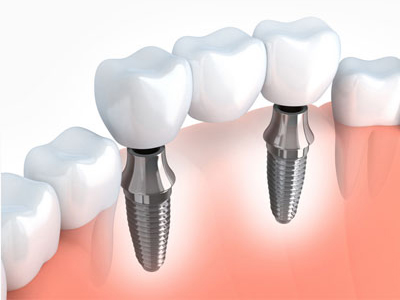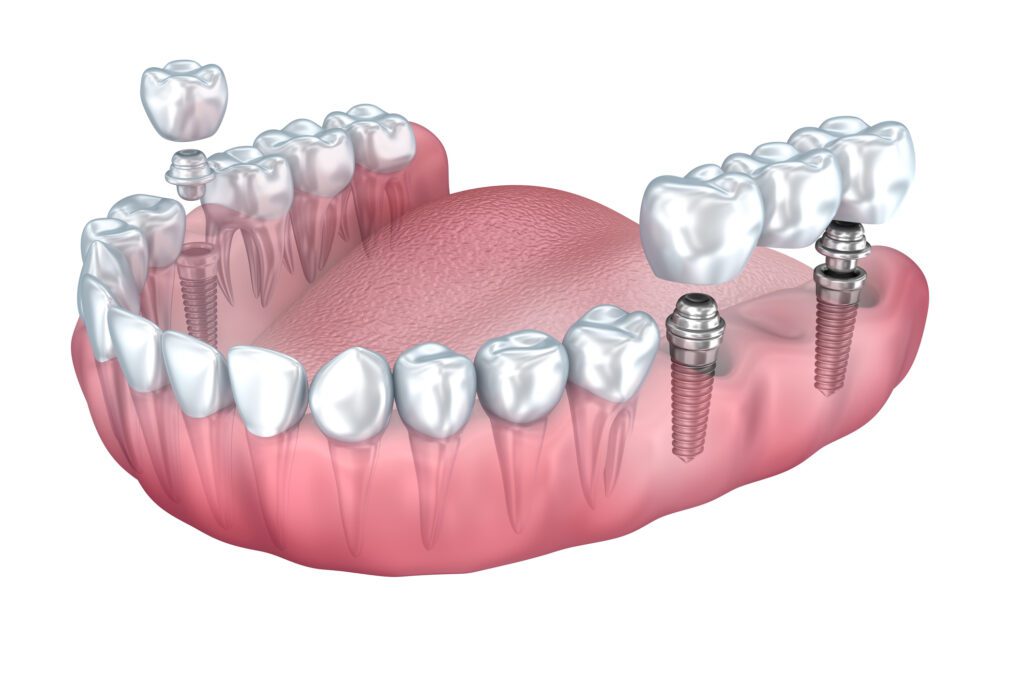When considering dental implants, one of the first questions that comes to mind is, “How much will dental implant cost?” While dental implants are a long-term investment in your oral health, the associated costs can sometimes feel overwhelming. Understanding what goes into the price of dental implants is essential for making an informed decision. The cost isn’t just about the final result; it’s a combination of various materials and procedural fees that add up throughout the process.
In this blog post, we will break down the costs associated with dental implants, providing you with a clear understanding of what you’re paying for. From the materials used, like the implant fixture and crown, to the procedures involved, such as implant surgery and follow-up visits, we’ll explore each component in detail. By the end, you’ll have a comprehensive view of where your money goes, helping you to budget effectively and make the best choice for your dental health.

Overview of Dental Implant Cost
Dental implants are widely regarded as one of the most effective and durable solutions for replacing missing teeth. However, they also come with a significant financial investment. The dental implant cost can vary widely, depending on several factors, including the complexity of the case, the materials used, and the location of the dental practice.
General Cost Range:
The cost of a single dental implant typically ranges between Rs.25,000/- and Rs.40,000/-. This price generally includes the implant fixture (which is the titanium screw placed in the jawbone), the abutment (which connects the implant to the crown), and the dental crown itself. For more extensive procedures, such as replacing multiple teeth or full-mouth reconstruction, costs can rise substantially, sometimes reaching Rs.50,000/- to Rs.3,00,000/- or more.
Factors Influencing Dental Implant Cost:
- Location: Geographic location plays a significant role in the cost. Dental practices in major urban areas or regions with a high cost of living typically charge more than those in smaller towns or rural areas.
- Dentist’s Expertise: The experience and reputation of the dentist or oral surgeon performing the procedure can also affect the cost. Highly skilled practitioners who specialize in implants may charge higher fees, reflecting their expertise and the quality of care provided.
- Type of Implant: The specific type of implant used, including the material (such as titanium or zirconia) and the brand, can impact the overall price.
- Additional Procedures: The need for additional procedures, such as bone grafting, sinus lifts, or tooth extractions, will increase the total cost. These procedures are sometimes necessary to ensure the implant’s success and longevity.
- Technology Used: Advanced technologies, such as 3D imaging and computer-guided surgery, can improve the accuracy and outcomes of dental implants. However, the use of such technologies can also add to the overall cost.
Long-Term Value:
While the upfront dental implant cost may seem high, it’s important to consider the long-term benefits. Dental implants are designed to be a permanent solution, offering superior durability, functionality, and aesthetics compared to other tooth replacement options like dentures or bridges. Their longevity and ability to preserve jawbone health can provide significant value over time, making them a worthwhile investment for many patients.
Dental Implant Cost – Material factor
The dental implant cost is significantly influenced by the materials used in the procedure. Each component of the implant system—comprising the implant fixture, the abutment, and the dental crown—requires specific materials that impact both the quality and the price of the treatment. Here’s a detailed look at the material costs involved in dental implants:

1. Implant Fixture
- Description: The implant fixture is the foundation of a dental implant. It’s a small, screw-like post that is surgically placed into the jawbone, where it acts as the root of the artificial tooth. The fixture is typically made from titanium or zirconia, both of which are biocompatible materials, meaning they integrate well with human bone tissue.
- Cost Range: The cost of the implant fixture can range from Rs.25,000 to Rs.50,000, depending on the material and the manufacturer.
- Factors Affecting Cost:
- Material Choice: Titanium is the most commonly used material due to its durability, biocompatibility, and long history of successful use in medical implants. Zirconia, while more expensive, offers an aesthetic advantage, as it is tooth-colored and may be preferred for patients concerned about metal allergies or visible metal in the mouth.
- Manufacturer: Different manufacturers produce implant fixtures with varying designs and technology, which can affect the cost. Premium brands known for higher success rates and advanced features generally come at a higher price.
2. Abutment
- Description: The abutment is the connector piece that joins the implant fixture to the dental crown. It is placed on top of the implant fixture after the healing process, serving as the base on which the crown is mounted. Abutments are usually made from titanium, zirconia, or a combination of metal and ceramic.
- Cost Range: The cost for an abutment typically ranges from Rs.8,000 to Rs.20,000.
- Factors Affecting Cost:
- Material: Similar to the implant fixture, titanium and zirconia are the primary materials used. Zirconia abutments tend to be more expensive due to their superior aesthetics, especially in cases where the abutment might be visible.
- Customization: Some cases require custom abutments to ensure the best fit and appearance, which can increase the cost compared to standard, pre-fabricated abutments.
3. Dental Crown
- Description: The dental crown is the visible part of the implant that looks and functions like a natural tooth. It is custom-made to match the shape, size, and color of the surrounding teeth, ensuring a seamless appearance. Crowns can be made from various materials, including porcelain, ceramic, metal, or a combination of these materials.
- Cost Range: The cost of a dental crown can range from Rs.8,000 to Rs.20,000.
- Factors Affecting Cost:
- Material Choice: Porcelain and ceramic crowns are the most popular due to their natural appearance and ability to blend with natural teeth. Metal crowns, while durable, are often less expensive but may not be aesthetically pleasing, particularly for front teeth.
- Craftsmanship: The quality of the dental lab where the crown is made also plays a role in the cost. High-end labs use advanced technology and skilled technicians to create crowns that are highly customized and natural-looking, which can increase the price.
Summary of Material Costs
The total material cost for a single dental implant can range from approximately Rs.25,000 and Rs.40,000, depending on the materials chosen for the implant fixture, abutment, and crown. Investing in high-quality materials not only enhances the longevity and success of the implant but also ensures that the final result is both functional and aesthetically pleasing.
Understanding the material costs associated with dental implants helps patients appreciate the value behind the investment, leading to informed decisions about their dental care.
Procedural Fees in Dental Implants
In addition to material costs, the procedural fees associated with dental implants contribute significantly to the overall price. These fees cover the various stages of the treatment process, from the initial consultation to the final placement of the implant and crown. Understanding these fees helps clarify why dental implants are often considered a premium option for tooth replacement. Here’s a breakdown of the key procedural costs involved:
1. Initial Consultation and Diagnostic Tests
- Description: The dental implant process begins with a thorough evaluation by a dentist or oral surgeon. This includes an initial consultation, during which the patient’s oral health is assessed, and diagnostic tests are conducted to determine the suitability for implants.
- Cost Range: The cost for this stage typically ranges from Rs.300 to Rs.500/-.
- Key Components:
- Consultation Fee: This fee covers the time and expertise of the dental professional in assessing the patient’s needs and discussing treatment options.
- Diagnostic Imaging: X-rays and, in many cases, a CT scan are required to evaluate bone density and structure. These images are crucial for planning the implant placement with precision.
2. Tooth Extraction (if needed)
- Description: If the patient has a damaged or decayed tooth that needs to be replaced, tooth extraction may be necessary before the implant can be placed. This is a common preparatory step in the implant process.
- Cost Range: Tooth extraction can cost between Rs.1,000 and Rs.8,000. per tooth, depending on the complexity of the extraction.
- Factors Affecting Cost:
- Simple vs. Surgical Extraction: Simple extractions are less costly and involve removing teeth that are visible above the gumline. Surgical extractions, required for impacted or broken teeth, are more complex and expensive.
- Anesthesia: The type of anesthesia used (local, sedation, or general) can also impact the cost.
3. Bone Grafting (if needed)
- Description: In cases where the jawbone is insufficient to support an implant, bone grafting may be required. This procedure involves adding bone material to the jaw to create a stable foundation for the implant.
- Types of Bone Grafts:
- Autograft: Bone harvested from the patient’s own body, typically the most expensive option due to the additional surgery required.
- Allograft: Bone sourced from a donor, usually less expensive than autografts.
- Synthetic: Man-made bone substitutes, often used for minor grafts, may be more affordable.
4. Implant Placement Surgery
- Description: This is the primary procedure where the implant fixture is surgically placed into the jawbone. The surgery requires precision and expertise to ensure the implant integrates properly with the bone.
- Cost Range: The cost of implant placement surgery typically falls between Rs.25,000 to Rs.50,000. per implant.
- Factors Affecting Cost:
- Dentist’s Expertise: Experienced implant specialists may charge higher fees due to their advanced skills and success rates.
- Technology: The use of advanced technology, such as computer-guided surgery, can increase costs but often results in more accurate and successful outcomes.
- Anesthesia: The type of anesthesia (local, sedation, or general) impacts the overall cost, with sedation or general anesthesia adding to the expense.
5. Follow-Up Visits and Adjustments
- Description: After the implant is placed, follow-up visits are necessary to monitor healing, ensure the implant is integrating properly with the bone, and make any needed adjustments. These visits continue until the final crown is placed and the implant is fully functional.
- Cost Range: Follow-up visit costs can range from $100 to $300 per visit, depending on the complexity of the case.
- Importance:
- Monitoring Healing: Regular check-ups are crucial to ensure the implant is healing correctly and to prevent complications.
- Adjustments: If the implant needs to be adjusted or if additional treatments, such as soft tissue management, are required, these can add to the overall cost.
Summary of Procedural Fees
The total procedural fees for a single dental implant can range from approximately Rs.30,000/- to Rs.60,000/-, depending on the complexity of the case and the specific procedures required. These fees reflect the extensive care, precision, and expertise needed to ensure the success of the implant.
Understanding the procedural costs involved in dental implants helps patients prepare financially and appreciate the level of care required for this advanced dental treatment.
Conclusion
In conclusion, the dental implant cost is influenced by a combination of material expenses and procedural fees, each contributing to the overall investment in this highly effective tooth replacement option. From the high-quality materials used in the implant fixture, abutment, and crown, to the detailed procedures required for successful placement, every step is designed to ensure durability, functionality, and aesthetics.
While the initial cost may seem substantial, it’s important to recognize the long-term value that dental implants offer. They not only restore your smile but also improve your oral health and quality of life. By understanding the breakdown of these costs, you can make informed decisions, budget effectively, and choose the best options for your needs. Dental implants are a significant investment, but with the right information and guidance, you can approach this process with confidence, knowing that you’re making a choice that will benefit you for years to come.

